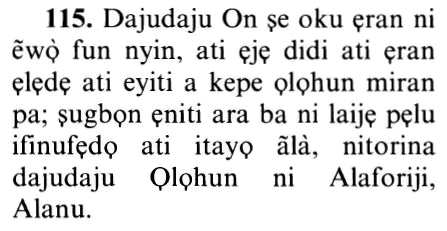16vs115
Select any filter and click on Go! to see results
إِنَّمَا حَرَّمَ عَلَيْكُمُ الْمَيْتَةَ وَالْدَّمَ وَلَحْمَ الْخَنزِيرِ وَمَا أُهِلَّ لِغَيْرِ اللّهِ بِهِ فَمَنِ اضْطُرَّ غَيْرَ بَاغٍ وَلاَ عَادٍ فَإِنَّ اللّهَ غَفُورٌ رَّحِيمٌ
Innama harrama AAalaykumu almaytata waalddama walahma alkhinzeeri wama ohilla lighayri Allahi bihi famani idturra ghayra baghin wala AAadin fainna Allaha ghafoorun raheemun
Index Terms
Click to play
Yoruba Translation

Hausa Translation
Abin sani kawai (Allah) Ya haramta(3) muku mussai da jini da nãman alade da abin da aka ambaci sũnan wanin Allah game da shi. Sa´an nan wanda aka tĩlasta a kan jama´a kuma baicin mai zãlunci, to, lalle Allah ne Mai gãfara, Mai jin ƙai.
Asbabu n-Nuzuul (Occasions of Revelation)
إِنَّمَا حَرَّمَ عَلَيْكُمُ الْمَيْتَةَ وَالْدَّمَ وَلَحْمَ الْخَنزِيرِ ...
So eat of the lawful and good food which Allah has provided for you. And be grateful for Allah's favor, if it is He Whom you worship.
He has only forbidden dead flesh, blood, the flesh of swine, and any animal which is slaughtered as a sacrifice for other than Allah.
Allah orders His believing servants to eat the good and lawful things that He has provided, and to give thanks to Him for that, for He is the Giver and Originator of all favors, Who alone deserves to be worshipped, having no partners or associate.
Then Allah mentions what He has forbidden things which harm them in both religious and worldly affairs, i.e., dead meat, blood and the flesh of pigs.
... وَمَآ أُهِلَّ لِغَيْرِ اللّهِ بِهِ ...
and any animal which is slaughtered as a sacrifice for other than Allah.
meaning, it was slaughtered with the mention of a name other than that of Allah.
Nevertheless,
... فَمَنِ اضْطُرَّ ...
But if one is forced by necessity,
meaning, if one needs to do it,
... غَيْرَ بَاغٍ وَلاَ عَادٍ ...
without willful disobedience, nor transgressing,
i.e. without deliberately disobeying or transgressing, then,
... فَإِنَّ اللّهَ غَفُورٌ رَّحِيمٌ ﴿١١٥﴾
Allah is Pardoning, Most Merciful.
We have already discussed a similar Ayah in Surah Al-Baqarah, and there is no need to repeat it here. And to Allah be praise.
Then Allah forbids us to follow the ways of the idolators who declare things to be permitted or forbidden based upon their own whims and whatever names they agree on, such as;
the Bahirah (a she-camel whose milk was spared for the idols and nobody was allowed to milk it),
the Sa'ibah (a she-camel let loose for free pasture for their false gods, idols, etc., and nothing was allowed to be carried on it),
the Wasilah (a she-camel set free for idols because it has given birth to a she-camel at its first delivery and then again gives birth to a she-camel at its second delivery), and
the Ham (a stallion camel freed from work for the sake of their idols, after it had finished a number of acts of copulation assigned for it), and so on.
All of these were laws and customs that were invented during jahiliyyah.
Then Allah says:
ثم ذكر تعالى ما حرمه عليهم مما فيه مضرة لهم في دينهم ودنياهم من الميتة والدم ولحم الخنزير " وما أهل لغير الله به " أي ذبح على غير اسم الله ومع هذا " فمن اضطر " إليه أي احتاج من غير بغي ولا عدوان " فإن الله غفور رحيم " وقد تقدم الكلام على مثل هذه الآية في سورة البقرة بما فيه كفاية عن إعادته ولله الحمد .
" إنما " كلمة موضوعة للحصر , تتضمن النفي والإثبات ; فتثبت ما تناوله الخطاب وتنفي ما عداه , وقد حصرت ها هنا التحريم , لا سيما وقد جاءت عقيب التحليل في قوله تعالى : " يا أيها الذين آمنوا كلوا من طيبات ما رزقناكم " فأفادت الإباحة على الإطلاق , ثم عقبها بذكر المحرم بكلمة " إنما " الحاصرة , فاقتضى ذلك الإيعاب للقسمين ; فلا محرم يخرج عن هذه الآية , وهي مدنية , وأكدها بالآية الأخرى التي روي أنها نزلت بعرفة : " قل لا أجد في ما أوحي إلي محرما على طاعم يطعمه " [ الأنعام : 145 ] إلى آخرها ; فاستوفى البيان أولا وآخرا ; قال ابن العربي . وسيأتي الكلام في تلك في " الأنعام " إن شاء الله تعالى .
I'raab - grammatical analysis of the Qur'an
«إِنَّما» كافة ومكفوفة.
«حَرَّمَ» ماض فاعله مستتر.
«عَلَيْكُمُ» متعلقان بحرم.
«الْمَيْتَةَ» مفعول به والجملة مستأنفة.
«وَالدَّمَ وَلَحْمَ» عطف على الميتة.
«الْخِنْزِيرِ» مضاف إليه.
«وَما» ما موصولية معطوفة على ما سبق.
«أُهِلَّ» ماض مبني للمجهول ونائب الفاعل محذوف والجملة صلة.
«لِغَيْرِ» متعلقان بمحذوف حال.
«اللَّهِ» لفظ الجلالة مضاف إليه.
«بِهِ» متعلقان بأهل.
«فَمَنِ» الفاء عاطفة ومن شرطية مبتدأ.
«اضْطُرَّ» ماض مبني للمجهول ونائب الفاعل مستتر.
«غَيْرَ» حال.
«باغٍ» مضاف إليه.
«وَلا عادٍ» معطوف على باغ.
«فلا» الفاء رابطة للجواب ولا نافية للجنس.
«إثم» اسمها والجملة في محل جزم جواب الشرط.
«عليه» متعلقان بالخبر المحذوف.
«فَإِنَّ اللَّهَ» إن واسمها.
«غَفُورٌ رَحِيمٌ» خبرا إن والجملة مستأنفة.
